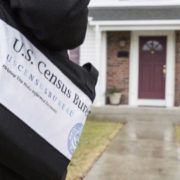The Supreme Court on Thursday, June 27 rejected the Trump administration’s citizenship question from being included in the 2020 Census questionnaire.
In his majority opinion released after the 5-4 ruling, Chief Justice John G. Roberts, Jr. wrote that the administration’s justification and intentions for the citizenship questions “seem to have been contrived.”
The decennial count of all persons living in the United States (slated for April, 1, 2020) determines the appropriation of representatives each state gets in the House as well as the allocation of federal funds to each state — the larger the population, the more representatives and funding each state gets. (These funds are typically diverted to public uses such as Medicaid, housing assistance and public education among other programs.)
It also determines how electoral districts are drawn.
The last time the census asked about residents’ citizenship was in the 1950 census survey which asked, “If foreign born — Is he naturalized?” (In 1960, there was a question about birthplace, but didn’t ask about naturalization.)
Then in March 2018, Commerce Secretary Wilbur Ross sent out a memo with plans to reinstate the citizenship question on the 2020 count.
According to Ross, the request came from the Dept. of Justice (DOJ) which “sought out improved data” about the voting-age population who were citizens with the purpose of better enforcing the Voting Rights Act (VRA).
In short, Ross reasoned that the DOJ required more accurate citizenship data and that existing resources — the regularly distributed American Community Survey (ACS) and the Social Security Administration and the U.S. Citizenship and Immigration Services — were inadequate.
But Roberts wrote in his majority opinion that the documented presented in the case showed that the Commerce Department — despite claiming it was acting on a “routine data request” from the DOJ — went out of its way to “elicit” a request from the DOJ “or any other willing agency.”
“We are presented, in other words, with an explanation for agency action that is incongruent with what the record reveals about the agency’s priorities and decision-making process,” Roberts wrote. “Several points, considered together, reveal a significant mismatch between the decision [Ross] made and the rationale he provided.”
Per the majority ruling, Census Bureau officials have “resisted occasional proposals” to continue asking about citizenship on the questionnaire in fear that including a citizenship question will alter the true count of states with high concentrations of undocumented residents who may fear that divulging their citizenship status could open up the door for deportation.
Since Ross’ memo in 2018, lawmakers and Asian and Pacific Islander (API) advocacy organizations have decried the proposed reinstatement of the citizenship question on grounds that it serves to alter the true count of regions that have higher concentrations of undocumented immigrants like Los Angeles.
Asian American Action Fund Board Member Caroline Fan said in a statement, “The inclusion of the census citizenship question is a deliberate effort to erase AAPI communities and communities of color, and to disenfranchise us. The highest and only goal of the Census is a complete and accurate count. This question instills fear and decreases participation by our families, particularly considering that many families are of mixed immigration status, and that 1 in 7 AAPIs is undocumented.”
LA County Supervisor Mark Ridley-Thomas praised the court’s decision in ensuring that the 2020 census moves toward a more accurate count.
“In Los Angeles County, we face a special challenge. We’re home to one of the most diverse populations in the world. The world is Los Angeles County and Los Angeles County is the world,” Ridley-Thomas wrote in a statement. “This means we have our work cut out for us to reach historically hard-to-count population groups, such as people of color, low-income residents, immigrants, and people without higher education. Young children and young families are particularly at risk.”
But the Supreme Court’s decision doesn’t kill the citizenship question altogether.
Following the ruling, President Donald Trump announced that he is seeking legal advice to delay the census count to give the administration more time to better organize its reasoning for why it thinks the citizenship question is necessary.
“Seems totally ridiculous that our government, and indeed Country, cannot ask a basic question of Citizenship in a very expensive, detailed and important Census, in this case for 2020,” Trump tweeted on Thursday. “I have asked the lawyers if they can delay the Census, no matter how long, until the United States Supreme Court is given additional information from which it can make a final and decisive decision on this very critical matter.”(Klarize Medenilla/AJPress)






